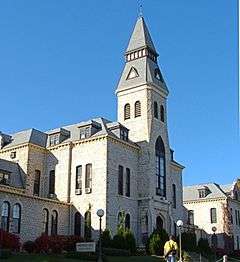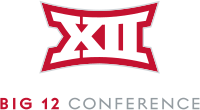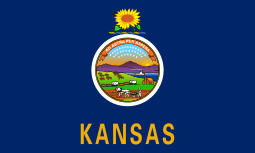Kansas State Wildcats
| Kansas State Wildcats | |
|---|---|
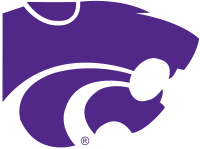 | |
| University | Kansas State University |
| Conference | Big 12 |
| NCAA | Division I |
| Athletic director | John Currie |
| Location | Manhattan, Kansas |
| Varsity teams | 14 |
| Football stadium | Bill Snyder Family Stadium |
| Basketball arena | Bramlage Coliseum |
| Baseball stadium | Tointon Family Stadium |
| Soccer stadium | Memorial Stadium |
| Other arenas | Ahearn Field House |
| Mascot | Willie the Wildcat |
| Nickname | Wildcats |
| Fight song | Wildcat Victory |
| Colors |
Royal Purple and White[1] |
| Website |
www |
|
| |
The Kansas State Wildcats (variously "Kansas State", "K-State" or "KSU") are the intercollegiate athletic teams that represent Kansas State University. The official color of the teams is Royal Purple, making Kansas State one of very few schools (including also Syracuse and Harvard) that have only one official color; white and silver are generally used as complementary colors.[2]
Kansas State participates in the NCAA's Division I (Football Bowl Subdivision) and is a member of the Big 12 Conference since 1996. Previously, Kansas State competed in the Kansas Collegiate Athletic Conference until 1912; the Missouri Valley Intercollegiate Athletic Association from 1913 to 1928; and the Big Eight Conference from 1928 to 1996 (known as the Big Six from 1928–47 and the Big Seven from 1947–57). Until 2014, the women's rowing team also had dual membership in Conference USA, until the Big 12 began sponsoring rowing for the 2015 season.[3]
Athletics department
Kansas State offers fourteen sports at a varsity level. As of July 2015, Kansas State has won 78 total conference championships through the years, not counting titles captured in the old Kansas Intercollegiate Athletic Association (see chart below).[4] Kansas State has not won any team NCAA championships, but has had dozens of individual national champions.[5][6]
The Kansas State Wildcats are currently represented in the following NCAA Division I varsity sports:
|
Men's sports
|
Women's sports
|
Kansas State announced it will discontinue its sponsorship of women's equestrian at the conclusion of the 2015-16 season and replace it with women's soccer in the fall of 2016.[7]
In 2012−2013, Kansas State became the second Big 12 school to win conference titles in football, men's basketball, and baseball in the same school year.[8] In the 2007−2008 school year, Kansas State was the only school in the nation to have a consensus All-America in both football (Jordy Nelson) and men's basketball (Michael Beasley).[9]
History
Athletic competition began within the first decade after the founding of Kansas State Agricultural College in 1863, as students began organizing and playing games of baseball against locals from Manhattan.[10][11] Beginning in 1890, a baseball game between the faculty and the senior class became an annual feature of graduation day.[11]
According to most sources, intercollegiate competition began on Thanksgiving Day 1893, when Kansas State's football team defeated St. Mary's College 18-10.[10][12][13] A baseball match against St. Mary's College followed on May 26, 1894.[10][11] (St. Mary's was a regional athletics powerhouse, whose recent graduates included baseball pioneers Charles Comiskey and Ted Sullivan.) These matches are not, however, reflected in the school's official histories, and the first official contest recorded is a 14-0 loss to Fort Riley in a football game on November 28, 1896.[14]

By the turn of the century, Kansas State was competing in the Kansas Intercollegiate Athletic Association, along with the University of Kansas and other state schools. Adopting a more organized approach to athletics, in 1911 an "athletic committee" was created at the school to set policy and schedule contests, among other duties.[11] On the heels of athletic success in the Kansas conference, including a 1912 football championship, Kansas State was invited to join the more prestigious Missouri Valley Intercollegiate Athletic Association (MVIAA) in 1913. In 1916 head football and basketball coach Z.G. Clevenger was elected the school's first official Athletic Director.[11] Clevenger was assisted in that role by former football star Germany Schulz. In 1928, when the "Big Six" members of the MVIAA split away from the smaller schools of the Missouri Valley, Kansas State was included in its membership.
The school's commitment to athletics dipped thereafter. According to longtime Wildcat radio announcer Dev Nelson, after World War II Kansas State was one of the few major schools that didn't make a significant investment in its football program, or athletics overall.[15] Indeed, for many years the Wildcats spent far less on athletics than any other Big Eight school.[15] Between 1969 and 1975 the school added women's programs, but also cut four men's sports: men's swimming, wrestling, men's gymnastics and men's tennis. As recently as 1987-1988 the University of Oklahoma (the Big Eight's second smallest school) spent $12.5 million on athletics while Kansas State spent only $5.5 million.[15] In more recent decades, however, the school has recommitted significant resources to athletics, and in 2012 it was the most profitable athletics department in the United States.
Administration
Athletics at Kansas State University are administered by the University's Department of Intercollegiate Athletics. The department is headed by the Athletic Director. The Athletic Directors over the years at Kansas State University are:
| Director | Years | Notes |
|---|---|---|
| Z.G. Clevenger | 1916–1920 | First Athletic Director, member of College Football Hall of Fame |
| Mike Ahearn | 1920–1947 | Considered "Father of Kansas State Athletics" |
| Thurlo E. McCrady | 1947–1950 | |
| Lawrence A. (Moon) Mullins | 1951–1955 | |
| H.B. "Bebe" Lee | 1956–1968 | Member of National Association of Collegiate Directors of Athletics Hall of Fame |
| Ernie Barrett | 1969–1975 | known as "Mr. K-State" |
| Johny "Jersey" Jermier | 1976–1977 | |
| DeLoss Dodds | 1978–1981 | |
| Dick Towers | 1981–1985 | |
| Larry Travis | 1985–1988 | |
| Steve Miller | 1988–1991 | |
| Milt Richards | 1991–1993 | |
| Max Urick | 1993–2001 | |
| Tim Weiser | 2001–2008 | Resigned from K-State to become the Big 12's deputy commissioner |
| Bob Krause | 2008–2009 | |
| John Currie | 2009–present |
Baseball
The Wildcats call Tointon Family Stadium home. The team's head coach is Brad Hill.
Kansas State's baseball team officially began play in 1897. The Wildcats earned what is believed to be the school's first varsity championship in 1907 under coach Mike Ahearn.[16] The Wildcats went on to win a Missouri Valley Conference championship in 1928, and Big Six Conference championships in 1930 and 1933. The school's most recent championship was the Big 12 Conference regular season championship in 2013. Kansas State's best finish at the Big 12 Conference Baseball Tournament is a runner-up finish in the 2008 tournament.
The Wildcats have traditionally not been competitive on a national scale, but in 2009 the team made its first appearance in the NCAA Tournament, and it has returned three times since. Coach Brad Hill's teams also earned the school's first national rankings in the USA Today/ESPN Coach's Poll in the 2009 and 2010 seasons.[17]
Other milestones in the team's history include Earl Woods, the father of golfer Tiger Woods, becoming the first African-American baseball player in the Big Seven Conference in 1952, as well as all-time coaching wins leader Mike Clark winning the Big Eight Coach of the Year award in 1990.
Basketball
The men's and women's basketball teams play their home games in Bramlage Coliseum, nicknamed the "Octagon of Doom".
Men's basketball
Kansas State's men's basketball team began competition in 1902. The program has a long history of success. The first two major conference titles captured by the school were won in the sport, in 1917 and 1919, in the Missouri Valley Conference. Kansas State has gone on to capture 18 conference crowns in the sport. The program has also appeared in 27 NCAA basketball tournaments. Kansas State lost to the University of Kentucky for the national championship in 1951, and has reached the Final Four four times, the Elite Eight 12 times, and the Sweet Sixteen 16 times. K-State has finished ranked in the top ten of the AP Poll or Coaches Poll on nine occasions (most recently in 2010), and in the final top 25 polls fifteen total times. When Street & Smith's Annual listed the 100 greatest college basketball programs of all time in 2005, K-State ranked 22nd.
After a lengthy period with little success during the 1990s and 2000s, Kansas State has returned to prominence. Following a twelve-year absence, the team was invited to the 2008 NCAA tournament under first-year head coach Frank Martin. Following that season, Kansas State freshman Michael Beasley was named an All-American and Big 12 Conference Player of the Year. In the 2009–10 season, the team spent much of the year ranked in the Top 10 of the polls and finished second in the Big 12 with an 11-5 record. The team received a #2 seed for the 2010 NCAA Tournament, and beat North Texas, BYU and Xavier to advance to the Elite Eight. On March 31, 2012, Bruce Weber was announced as head coach, after the departure of Frank Martin. Weber led the 2012-13 team to the school's first regular-season conference championship since 1977, and took the team to the NCAA tournament in each of his two seasons.
Women's basketball
Kansas State's women's basketball team began intercollegiate competition in 1968. The team is among the top 15 all-time winningest programs in the NCAA.
The women's team has participated in 19 total NCAA basketball tournaments and AIAW tournaments (pre-NCAA), the second-most appearances in the Big 12 Conference. K-State has finished ranked in the Top 10 of the AP Poll on three occasions (1984, 2003, 2004), and in the top twenty nine times. Following the 2005–2006 season, Kansas State was crowned champion of the Women's National Invitation Tournament.
The current head coach is Jeff Mittie, who replaced Deb Patterson after the 2013–2014 season.
Football
Kansas State's football team officially began play in 1896 with a 14-0 loss to Fort Riley on November 28, 1896.[18] Despite some shining moments in the 1920s and 1930s, by 1989 the school was statistically the worst program in NCAA Division I with a record of 299–509–41.[15] Fortunes changed in 1989, when the athletic department hired Bill Snyder as head coach. Success and high rankings followed, culminating in a #1 national ranking during the 1998 season and a Big 12 Conference championship in 2003. Between the years of 1993 and 2003, Snyder's teams went 109–29–1 and attended eleven straight bowl games. Bill Snyder retired following the 2005 season, and Ron Prince was named the new head coach.
In three seasons, Prince guided the Wildcats to a 17–20 record and an appearance at the inaugural Texas Bowl. With three games left in the 2008 season, it was announced that Prince would not return for the 2009 season.[19] Prince was replaced by former head coach Bill Snyder, who returned to the school for a second stint. Snyder returned K-State to prominence in 2011, when the team went 10–2 in the regular season, finished second in the Big 12, and ended the season with a loss to the Arkansas in the 2012 Cotton Bowl Classic. The 2012 season was even more successful for the Wildcats, with a regular season record of 11–1 and a Big 12 Conference championship. Officially, K-State shared the 2012 conference championship with the Oklahoma Sooners, although the Wildcats won the head to head match-up, 24–19. The season ended with a loss in the 2013 Fiesta Bowl to the Oregon Ducks.
The team plays its home games at Bill Snyder Family Stadium, and the KSU Marching Band (also known as the Pride of Wildcat Land) performs at all home games, selected away games and all bowl games.
Track and field
Kansas State began competing in track and field in 1904. The team has won 23 conference championships. Its athletes have also achieved considerable national success.
Through the end of the 2011–2012 season, K-State athletes have won individual NCAA national championships 33 times. Twenty Kansas State athletes have attended 14 Olympic Games and have won eight medals, most recently at the 2012 Summer Olympics where Erik Kynard took silver in the high jump.
The current head coach is Cliff Rovelto. Rovelto has won a number of coach of the year awards during his tenure at Kansas State, and served as head coach for the U.S. Track & Field team at the 2011 Pan American Games and assistant for the team at the 2005 World Championships in Athletics in Helsinki.
Former coach Ward Haylett, who is enshrined in the National Track & Field Hall of Fame, left a strong imprint on the Kansas State program. Haylett was head coach at the school from 1928–1963.
Volleyball
The team currently plays in Ahearn Field House in Manhattan, Kansas.
Kansas State's women's volleyball team began intercollegiate competition in 1974. The team is among the all-time winningest programs in the NCAA.
As of the close of the 2014 season, the team has participated in 15 NCAA tournaments, including ten consecutive tournaments from 1996 to 2005. K-State also participated in the AIAW tournament in 1977. K-State has finished ranked in the top twenty of the AVCA poll six times, and in the top 25 on eleven occasions. The team most recently participated in the NCAA tournament in 2014.
The current head coach is Suzie Fritz. Fritz has led the Wildcats to several NCAA Tournament appearances and the school's first conference title in volleyball in 2003. As of the close of the 2008 season, Fritz also holds the second-highest winning percentage among all K-State's volleyball coaches after compiling a record of 148–70 (.679). In eight seasons as head coach, through the end of the 2008 season, Fritz has coached six All-Americans.[20]
Notable non varsity sports
Rugby
Kansas State rugby plays in the Heart of America conference against traditional rivals from the Big 12 north such as Kansas and Missouri. The Wildcats previously played college rugby in the Central Division, where they were champions in the 2009-10 and 2010-11 seasons.[21] In the 2011-11 season Kansas State reached the sweet 16 round of the national playoffs and finished the season ranked 8th.[22] The Wildcats best season was in 1981, when they reached the national semifinals.[23]
Rivalries
Kansas Jayhawks (Sunflower Showdown)
The first recorded meeting between Kansas State and KU in athletic competition was a baseball game in 1898. Since the early 1900s, when the schools began regularly competing in baseball, basketball, and football, the two teams schools and fans have developed a passionate rivalry.
Men's basketball
The rivalry on the hardwood peaked in the 1950s when both teams were national title contenders. A facilities race also began in the 1950s, starting with the construction of Kansas State's Ahearn Fieldhouse, which was one of the largest basketball facilities in the country with a capacity of 14,000 when opened in 1951. Kansas soon answered with Allen Fieldhouse, which would seat 16,300. The rivalry continued strong through the 1980s, but faded as Kansas began a 24-game win streak against the Wildcats in Manhattan in 1984. On January 30, 2008 #22 Kansas State upset #2 Kansas 84–75, winning against Kansas in Bramlage Coliseum for the first time with the aid of freshmen Michael Beasley and Bill Walker. Kansas State trails in the all-time series, 91–186.
Football
Historically, neither football program has had sustained success. The rivalry intensified for a period in the early 1990s as both teams entered the national rankings. In 1991 Head Coach Bill Snyder gained his first win against the Jayhawks and over the next 12 years Kansas would only beat the Wildcats once, in 1992, until KU finally won again in a home game in 2004. The rivalry intensified again in the 2000s as Kansas returned to relevance under Mark Mangino and the Wildcats struggled under Ron Prince.
Since 1969, the two teams have competed for the Governor's Cup. Kansas State leads during the Governor's Cup era 25–19–1, but trails in the all-time series, 43–64–5.
Nebraska Cornhuskers
Football
After the creation of the Big 12 Conference in 1996, through the early 2000s, the Wildcats and Cornhuskers consistently competed for the Big 12 North championship. Before the 1990s, however, the series was severely one-sided, with Kansas State losing 29 consecutive games to Nebraska until November 14, 1998 when the #1-ranked Wildcats beat #11 Nebraska 40–30. Kansas State subsequently beat Nebraska in 2000, 2002, 2003 and 2004. Nebraska still leads the series 78-15-2.
Volleyball
Nebraska was the Wildcats' biggest volleyball rival before leaving for the Big Ten Conference in 2011. Both teams were ranked in the AVCA Top 25 almost weekly during the Big 12 era, and Kansas State home games against Nebraska were promoted with T-shirts that read "Keep The Red Out."
History of racial integration
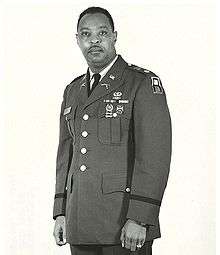
Kansas State historically has been welcoming to all races. The university has been open to enrollment by African Americans since its founding in 1863,[10] and as far back as the 1940s and 1950s (a time noted by many for its lack of civil rights in the United States), the leadership of K-State athletics took a strong stance in support of racial integration on its athletic teams.
Football
In 1949, African American Harold Robinson played football for Kansas State with an athletic scholarship. In doing so, Robinson broke the decades-long "color barrier" in Big Seven Conference athletics, and became the first ever African-American athlete on scholarship in the conference. Harold Robinson later received a letter of congratulations from Jackie Robinson, who had integrated major league baseball in 1947 while playing with the Brooklyn Dodgers.[24]
Baseball
In the spring of 1951, the conference color barrier in baseball was broken by Kansas State's Earl Woods (the father of golf great Tiger Woods). An indicator of the controversial nature of this position is reflected in an article published in The Tulsa World about an incident that occurred in the early 1950s during a baseball game:[25]
| “ | Former teammate Larry Hartshorn recalled an instance when the Wildcats were scheduled to play a spring game against a team from Mississippi. During warm-ups, the Mississippi coach took notice of Earl, and according to Hartshorn, the coach said his team would play the game only if the black player stayed on the bus. Instead, K-State coach Ray Wauthier put everybody on the bus. "We just left," Hartshorn said. | ” |
Men's basketball
Finally, in the winter of 1951–1952, Kansas State's Gene Wilson broke the conference color barrier in basketball, together with LaVannes C. Squires at the University of Kansas.[26]
Championships
| Major conference championships (1913–present)* | ||
|---|---|---|
| Sport | Titles | Year(s)[27][28][29][30] |
| Football | 3 | (The Big 12 Conference awards KSU 4 additional titles for winning its North Division)[30] |
| Men's basketball, regular season | 18 |
|
| Men's basketball, conf. tournament | 9 |
|
| Women's basketball, regular season | 13 |
|
| Women's basketball, conf. tournament | 4 |
|
| Baseball, regular season | 4 |
|
| Women's volleyball | 1 |
|
| Cross Country, men | 13 |
|
| Cross Country, women | 3 |
|
| Indoor Track & Field, men | 3 |
|
| Indoor Track & Field, women | 1 |
|
| Outdoor Track & Field, men | 1 |
|
| Outdoor Track & Field, women | 2 |
|
| Wrestling (discontinued) | 3 |
|
| Total | 78 | |
- * Not counting titles earned in the Kansas Intercollegiate Athletic Association, through 1912.
Conference membership history
- ????–1912: Kansas Intercollegiate Athletic Association
- 1913–1927: Missouri Valley Intercollegiate Athletic Association
- 1928–1947: Big 6 Conference
- 1948–1957: Big 7 Conference
- 1958–1995: Big 8 Conference
- 1996–Present: Big 12 Conference
NOTE: Two women's sports historically competed in other conferences when those sports were not sponsored by KSU's primary conference. Women's basketball competed in the "Kansas State Conference" for regular-season titles until the Big 8 began sponsoring a regular-season competition in 1982–1983, and women's rowing competed in Conference USA through the 2014 season.
Mascot
Notable alumni
References
- ↑ Kansas State University Brand Guide (PDF). Retrieved 2016-06-27.
- ↑ "Kansas State Traditions" (English). Retrieved July 2, 2014.
- ↑ "Big 12 Invites Affiliates to Rowing Championship" (Press release). Big 12 Conference. January 31, 2014. Retrieved June 12, 2014.
- ↑ "Kansas State Athletics Website". Retrieved 2012-03-05.
- ↑ "NCAA Men's Championships" (PDF). Archived from the original (PDF) on 2010-06-27. Retrieved 2009-06-03.
- ↑ "NCAA Women's Championships" (PDF). Retrieved 2009-06-03.
- ↑ "K-State to Discontinue Equestrian and Add Soccer" (Press release). Retrieved October 14, 2014.
- ↑ "Is K-State nation's hottest school?". Associated Press. March 12, 2013. Retrieved 2013-03-13.
- ↑ All-American fact
- 1 2 3 4 Olson, Kevin (2012). Frontier Manhattan. University Press of Kansas. p. 196. ISBN 978-0-7006-1832-3.
- 1 2 3 4 5 Willard, Julius (1940). History of Kansas State College of Agriculture and Applied Science. Kansas State College Press.
- ↑ Stallard, Mark (2000). Wildcats to Powercats: K-State Football Facts and Trivia. ISBN 1-58497-004-9.
- ↑ Kansas State University: A Pictorial History, 1863-1963 (Manhattan, KS: Kansas State University), 1962.
- ↑ "Year-by-Year Results for Kansas State" (English). Retrieved July 2, 2014.
- 1 2 3 4 Looney, Douglas (September 4, 1989). "Futility U". Sports Illustrated.
- ↑ Baseball Magazine, February 1909 Missing or empty
|title=(help) - ↑ K-State Baseball Enters Top 25
- ↑ "Year-by-Year Results for Kansas State" (English). Retrieved 2009-08-31.
- ↑ Prince fired after 2008
- ↑ "Susie Fritz biography". K-State Athletics website. Retrieved 2009-01-11.
- ↑ http://www.k-state.edu/kstaterugby/
- ↑ Rugby Mag, Final Men's D1 College Top 25, 2010/2011, May 17, 2011, http://www.rugbymag.com/men-di-college/870-final-mens-di-college-top-25-20102011.html
- ↑ Rugby Mag, K-State Crushed Truman En Route to Sweet 16, April 7, 2011, http://www.rugbymag.com/men's-di-college/403-k-state-crushes-truman-en-route-to-sweet-16.html
- ↑ "Athlete Who Broke Big 12 Race Barrier Dies". CBS College Sports. May 13, 2006. Retrieved 2010-03-17.
- ↑ "Tiger was raised by a Wildcat". The Tulsa World. August 3, 2007. Retrieved 2008-09-12.
- ↑ "Flawed history amended". Lawrence Journal-World. September 12, 2008. Retrieved 2008-09-12.
- ↑ "BigEightSports.com". Retrieved August 13, 2013.
- ↑ "Big Eight Conference basketball history" (PDF). Big 12 Conference. Retrieved August 13, 2013.
- ↑ "Big Eight Conference football record book" (PDF). Big 12 Conference. Retrieved August 13, 2013.
- 1 2 "All-Time Big 12 Championships". Big12Sports.com. Retrieved August 8, 2011.

